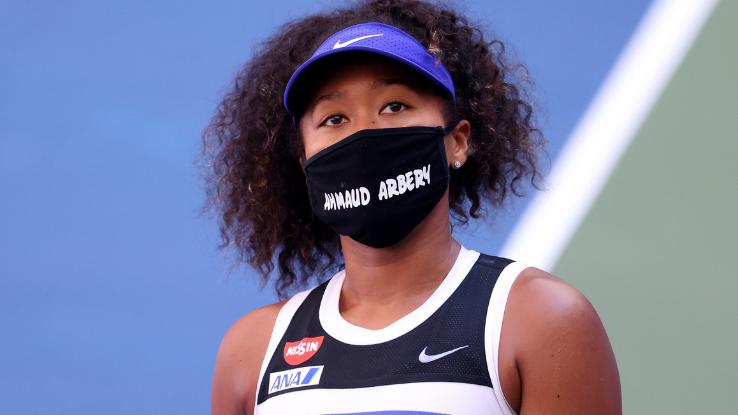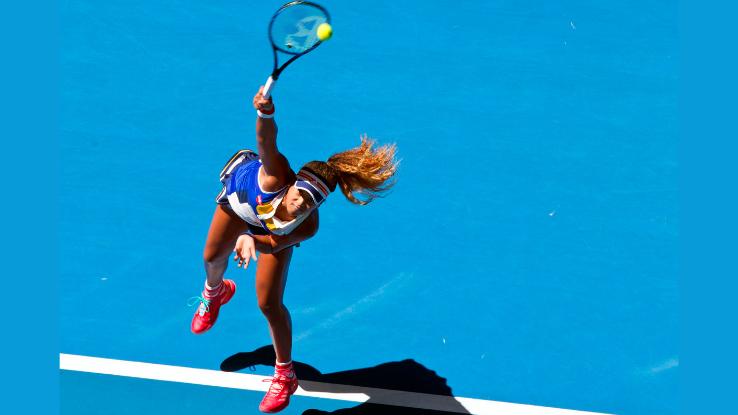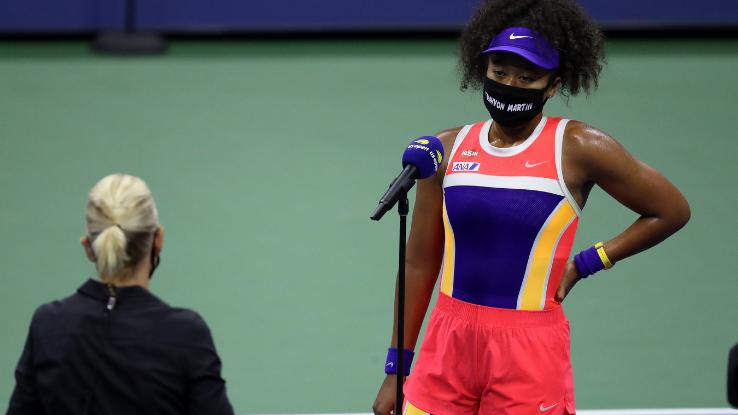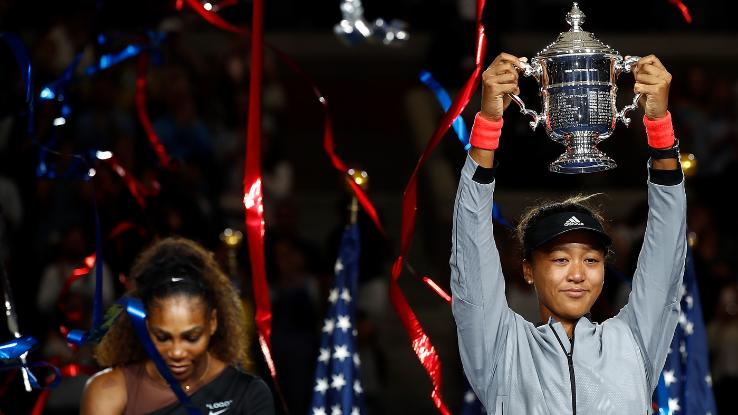
Tennis fans around the world anticipated that the 2020 U.S. Open would be more than a little different due to the COVID-19 pandemic. What they weren’t expecting? That Naomi Osaka’s standout contributions — both to the game but even more so to our social consciousness — would be what really transformed the tournament into something captivating.
While competing in the 2020 U.S. Open, Osaka consistently used her platform to keep the Black Lives Matter movement and victims of police brutality in the public eye. When she stepped onto the court for her first 2020 U.S. Open match, she surprised the world with a powerful tribute to Breonna Taylor, who was murdered by police while asleep in her home. Osaka also honored more Black victims of police violence throughout the competition, with the goal of sparking conversation and keeping the focus on those who deserve justice. And her activism didn’t end there.
Despite taking a stand on her own — with no teammates backing her up — Osaka’s fight for social change has endured. And its scope has been impressive in achieving her goal of raising awareness. She inspires others to think critically and challenges the norms of a sport with a long history of racism against Black women. In recent weeks, she’s also turned her attention toward mental health advocacy after withdrawing from the French Open due to the harmful effects of media obligations on her wellbeing. This brave tennis star continues to make meaningful statements, and she ensures her actions motivate others to address the real issues at the heart of her powerful protest.
Osaka Serves Social Justice on Social Media
As the daughter of a Japanese mother and a Haitian father, Osaka has experienced microaggressions and blatant racism throughout her life, from people dismissing her Japanese identity to others calling her “too sunburnt” or needing “some bleach.” Other Black athletes face the same issue, including Venus Williams, who has been penalized for her trademark hair and mocked in headlines. These harmful, racist attacks show how successful people of color are still not respected in tennis and by society. Previously, Osaka avoided escalating her responses to negative remarks. Now, she no longer remains silent about racism and social justice.

After George Floyd was murdered in 2020, people worldwide took to the streets to protest. During this time, Osaka flew to Minneapolis, where Floyd was killed, to join protests — without telling her coach or agent she was doing so. “We grieved with the people of St. Paul and protested peacefully. We visited the George Floyd Memorial and connected with those who came together to mourn yet another senseless act and life lost without reason. Being on the ground in Minneapolis was what felt right at that moment,” she said. The tragedy of Black lives lost to police brutality also drove the tennis superstar to speak out in support of Black Lives Matter, encouraging people to raise their voices, sign petitions and take action.
Like other athletes who discuss politics and social issues, Osaka received a lot of backlash. However, she had the perfect response to people online who attempted to discredit her activism: “I hate when random people say athletes shouldn’t get involved with politics and just entertain. Firstly, this is a human rights issue. Secondly, what gives you more right to speak than me? By that logic if you work at IKEA you are only allowed to talk about the ‘GRÖNLID’?” Osaka has found her voice, and she isn’t backing down. Along the way, she has inspired others, including powerful organizations and athletes, to speak out on political issues.
Her One-Woman Protest Ignited a Larger Movement
Osaka also fights for racial injustice and inequality in the arena, having refused to play in the semifinal match at the Western & Southern Open in August of 2020 to put a focus on police brutality against Black people — an ongoing issue that Osaka believes is more important than sports. Unlike athletes in the NBA and WNBA who stood together as teams in their dissent, she protested by herself following the police shooting of Jacob Blake. And her one-woman protest was equally powerful.

“Before I am an athlete, I am a Black woman,” Osaka wrote on Twitter. “I feel as though there are much more important matters at hand that need immediate attention, rather than watching me play tennis. Watching the continued genocide of Black people at the hand of the police is honestly making me sick to my stomach.” More than 100,000 people retweeted her post to show solidarity for her protest.
Her strike led the ATP, WTA and USTA tours to stop for a day for protest and inspired other tennis players to wear Black Lives Matter shirts. These actions continued the important conversation about racial inequality and social injustice — and demonstrated a demand for historic change. Osaka’s further advocacy gained even more attention, and she went beyond social media and boycotts in sending a message.
The Semifinal Strike Was Just the Beginning of Her Fight
People who watched the 2020 U.S. Open couldn’t ignore Osaka’s call for racial justice, thanks in large part to the face masks she wore that were emblazoned with the names of Breonna Taylor, Elijah McClain, George Floyd, Ahmaud Arbery, Trayvon Martin, Philando Castile and Tamir Rice — Black victims of police brutality.

Discussions of the masks spread far and wide, which was exactly Osaka’s goal — “The point was to make people start talking” and to keep the spotlight on the victims, she told reporter Tom Rinaldi. During news conferences, she answered questions about racial justice and Black Lives Matter instead of her performance in the matches. The masks helped viewers worldwide learn the victims’ names and sparked new discussions about what happened to them — and, most importantly, why that matters and what needs to be done about it. “I’m aware that tennis is watched all over the world, and maybe there is someone that doesn’t know Breonna Taylor’s Story,” Osaka said. “It’s a very big motivating factor for me just to try to…get the names out to as many people as I can.”
Osaka’s push for change is inspiring to fans and players alike. And knowing the history of racism in professional tennis makes the issues Osaka advocates for even more significant.
Osaka Has Come So Far — but Progress Is Still Needed
Historically, tennis has never welcomed women of color. In fact, the United States Tennis Association didn’t allow Black people to participate in tournaments when the U.S. Open began in 1881. So, Black players formed their own tennis clubs.

This started to change in 1950 as Althea Gibson paved the way for Black tennis players when she was invited to what’s now the U.S. Open after intense lobbying to secure her right to compete there. She also inspired Venus and Serena Williams to dominate the sport. Even still, these incredibly accomplished sisters face continued attacks from the institution and its fans, whether those criticisms are about their bodies, clothing or actions on the court.
The 2018 U.S. Open was another reminder of the racial inequities that are deeply rooted in tennis. In the last match against Osaka, Williams was penalized for small actions that white and male tennis players haven’t been struck for, including coaching and calling the umpire a “thief.” Mark Knight’s racist cartoon of Williams and Osaka’s whitewashing revealed the anti-Blackness still present in the tennis community and the country itself. These racial injustices and inequalities on the court and off show there’s much more work to do.
As one of the all-time top athletes in tennis, Osaka is doing that work — tackling racism, spreading awareness and changing the world. Tennis legend Billie Jean King — another groundbreaking player and champion for women’s rights — is proud of Osaka and perhaps put it best: “[Osaka] is a leader among today’s athletes — men and women — and she is speaking from her heart and her mind. It’s inspiring to watch a young leader step to the front and help humanity” as she rises to become a “catalyst for change.”






